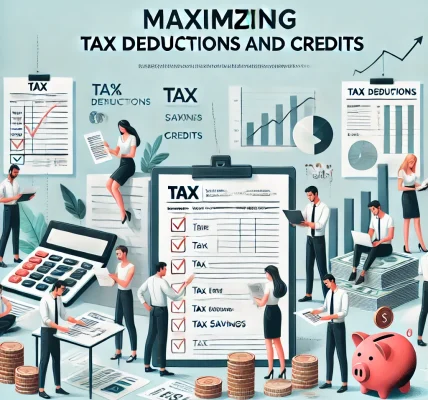Taxes are a significant part of everyone’s financial journey, but understanding how to minimize your tax liability can significantly improve your financial health. One of the most effective ways to reduce the amount you owe is by maximizing your tax deductions. Whether you’re an individual taxpayer or a business owner, knowing which deductions you’re eligible for and how to leverage them can lead to substantial tax savings.
In this guide, we’ll explore how to maximize deductions and save more on taxes, while ensuring you’re taking full advantage of available tax-saving opportunities.
What Are Tax Deductions?
Tax deductions reduce your taxable income, which in turn lowers your tax liability. For instance, if you have $50,000 in taxable income and $5,000 in deductions, you will only be taxed on $45,000. By lowering your taxable income, you can potentially move to a lower tax bracket, thus saving more money on taxes.
Deductions can be categorized into two types:
- Standard Deduction: A fixed amount set by the tax authorities that reduces your taxable income.
- Itemized Deductions: Specific expenses that you can deduct from your income. You need to keep track of eligible expenses and list them out to claim these deductions.
Why Maximizing Deductions Is Crucial
Maximizing deductions is key to lowering your overall tax bill. The more deductions you claim, the less you will owe. It’s important to remember that tax laws are constantly evolving, and new deductions are often introduced to incentivize savings for specific financial activities, such as retirement planning or education.
By strategically planning your finances and keeping track of deductible expenses, you can significantly reduce your taxable income and ultimately save more on taxes.
Top Ways to Maximize Deductions and Save More on Taxes
1. Contribute to Retirement Accounts (Section 80C and 80CCD)
Contributing to retirement accounts is one of the most effective ways to maximize your tax deductions. In many countries, contributions to retirement plans such as Employee Provident Fund (EPF), Public Provident Fund (PPF), or National Pension System (NPS) are eligible for deductions under tax laws.
How It Saves Taxes:
- Contributions to PPF and NPS qualify for tax deductions under Section 80C and Section 80CCD, respectively.
- The more you contribute to these accounts, the more you can reduce your taxable income.
- The growth in these retirement accounts is typically tax-deferred, meaning you won’t pay taxes on the interest earned until you withdraw the funds.
2. Take Advantage of Health Insurance Deductions (Section 80D)
Health insurance is not only a crucial part of financial security, but it can also help you save on taxes. Premiums paid for medical insurance for yourself, your spouse, children, and even your parents are deductible under Section 80D.
How It Saves Taxes:
- You can claim deductions up to ₹25,000 for insurance premiums paid for yourself and your family.
- If your parents are senior citizens, the deduction limit increases to ₹50,000.
- These deductions help reduce your taxable income while providing you with protection against medical emergencies.
3. Claim Deductions for Home Loan Interest (Section 24)
For many taxpayers, owning a home can lead to substantial tax savings. If you have a home loan, you can claim a deduction on the interest paid under Section 24.
How It Saves Taxes:
- You can claim a deduction of up to ₹2 lakh per year on the interest paid on your home loan.
- This deduction can be claimed for both self-occupied and rented properties, making it a versatile option for homeowners.
- Additionally, if you’re paying principal repayments on your home loan, those amounts are also eligible for deductions under Section 80C.
4. Invest in Tax-Saving Fixed Deposits (FDs) and National Savings Certificate (NSC)
Certain investment vehicles, such as Tax-Saving Fixed Deposits (FDs) and National Savings Certificates (NSC), provide tax-saving opportunities under Section 80C. These instruments offer fixed interest rates and have a lock-in period of 5 years.
How It Saves Taxes:
- Investments in tax-saving FDs and NSCs are eligible for a deduction of up to ₹1.5 lakh under Section 80C.
- Though the interest earned is taxable, these investments offer the benefit of tax-saving deductions while ensuring capital safety.
5. Make Charitable Donations (Section 80G)
Making donations to eligible charitable organizations can not only contribute to a cause you care about but also reduce your tax liability. Under Section 80G, donations to recognized charities can be deducted from your taxable income.
How It Saves Taxes:
- Donations to charities registered under Section 80G can provide a deduction of up to 100% or 50%, depending on the nature of the charity.
- Some donations are eligible for a 100% deduction, while others may provide a 50% deduction. Be sure to check the specific charity’s eligibility before donating.
- In addition to reducing taxes, charitable donations allow you to give back to society.
6. Claim Deductions for Education Loans (Section 80E)
Investing in education can also lead to tax savings. If you have taken out a loan for higher education, the interest paid on the loan is eligible for a tax deduction under Section 80E.
How It Saves Taxes:
- You can claim a deduction for the interest paid on loans taken for education (for yourself or a family member).
- The deduction is available for a maximum of 8 years or until the interest is paid, whichever comes earlier.
- This deduction helps reduce your taxable income while also supporting your educational goals.
7. Utilize the Standard Deduction (Section 16)
The Standard Deduction is available to salaried individuals and pensioners. This deduction is applied directly to your income, reducing the total amount subject to tax.
How It Saves Taxes:
- Salaried individuals can claim a standard deduction of ₹50,000 on their taxable income.
- Pensioners can also benefit from this deduction, which helps reduce their overall taxable income and save on taxes.
8. Invest in Sukanya Samriddhi Yojana (SSY)
If you are a parent of a girl child, the Sukanya Samriddhi Yojana (SSY) is a great way to save for her future while saving on taxes. This scheme provides tax benefits under Section 80C.
How It Saves Taxes:
- Contributions to SSY are eligible for tax deductions under Section 80C.
- The interest earned on SSY is tax-free, and the maturity proceeds are also tax-exempt.
Final Thoughts: Planning and Record-Keeping
To truly maximize your deductions and save more on taxes, effective planning is crucial. Regularly review your financial activities, track eligible expenses, and stay updated on tax laws. Additionally, keeping organized records of your expenses and investments will make it easier to claim your deductions come tax time.




